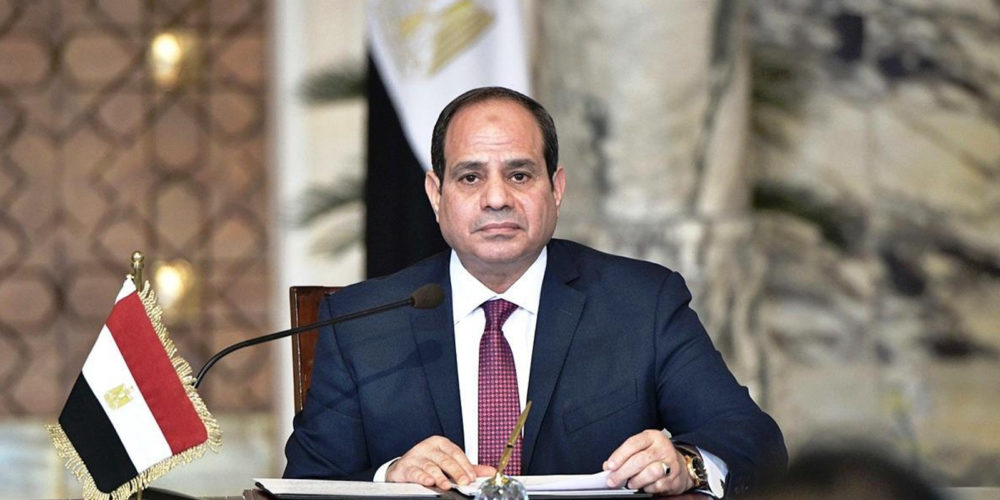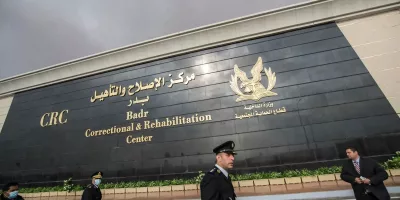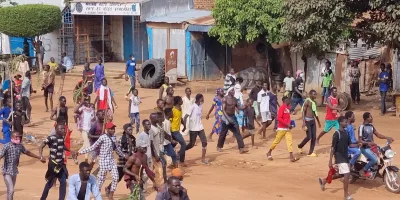As Egypt prepares for presidential elections in December 2023, the undersigned human rights organizations warn that Egypt is at a critical juncture and that failure to immediately begin a serious process of political and economic reform will significantly exacerbate the threat of instability and possible state failure. We believe that a third term for President Abdel Fattah al-Sisi will eliminate any chance for desperately needed reform, especially considering his unwillingness to acknowledge his central role in the ongoing human rights and economic crisis. President Sisi has even asserted in his most recent statements that he has no intention of changing course.
In the lead up to formally announcing his bid for a third presidential term, President Sisi referenced the Great Chinese Famine (1958-1962), stating that “in a country where 25 million people died from lack of food, [its citizens] didn’t rise up to destroy it, they built it into a superpower”. This statement is especially foreboding in light of his comments a day earlier stating that “if the price of construction, development, and progress is hunger and deprivation…then we will not eat or drink.” President Sisi has also remarked that it does not cost much to pay millions of people to mobilize on the streets and instigate chaos, effectively dismissing a scenario where regular citizens may express their grievances about the political and economic status quo.
The worst decade for human rights in Egypt’s modern history has ensued since President Sisi’s assumption of de-facto control over the country in July 2013. Though Egypt prior to 2011 was clearly authoritarian, the scope and severity of human rights abuses have drastically intensified after 2013. Thousands have been sentenced to death in unfair trials that United Nations experts have described as a “mockery of justice.” Close to a thousand protestors were killed by security forces in the second half of 2013, while extrajudicial executions have become an increasingly systematic practice across the country. Egyptian authorities have forcibly disappeared thousands of individuals, ultimately receiving more communications from the UN Working Group on Enforced and Involuntary Disappearances than any other state since 2020. Tens of thousands of peaceful individuals are imprisoned or detained on politically motivated charges. These include peaceful dissidents, journalists, academics, businessmen, and many ordinary citizens. Free media and civil society organizations are being systematically targeted in an attempt to silence them, either through highly restrictive legislation that has drawn criticism from the international community or through arrests. Egypt is now one of the biggest jailers of journalists in the world.
Our organizations previously warned that Egypt’s human rights crisis is not an inadvertent side effect of pursuing stability nor a “necessary evil”, but an intentional feature of the style of governance adopted by President Sisi since he came to power in 2013. Over the past decade, President Sisi has extended his direct control over state institutions, including nominally independent ones. The small margin of independence the judiciary had maintained prior to 2013 has been eroded through several legislative and constitutional amendments. And while Egypt’s legislative elections have a long history of fraud and intimidation of opposition, security control over the parliament has reached unprecedented levels under President Sisi’s tenure. Other institutions, such as the anti-corruption Administrative Monitoring Agency, is staffed with Sisi loyalists, including one of his sons.
The consequences of President Sisi’s style of governance are not limited to the ongoing human rights crisis but also include the severest economic crisis Egypt has faced in many decades. Monopoly over decision making, and lack of transparency and accountability, has allowed for predatory economic policies feeding patronage networks, including those with ties to the military, to expand unabated, rendering Egypt’s economy in shambles and at an extremely high risk of default. Record high government debt and inflation have left most Egyptians struggling to make ends meet amid popular discontent.
President Sisi persistently refuses to acknowledge this dire reality and his primary role in shaping it. Public relations initiatives such as the National Human Rights Strategy and the National Dialogue have repeatedly demonstrated their futility, especially considering that they fail to admit the scope and nature of Egypt’s human rights crisis. Meanwhile, the economic crisis is being falsely blamed entirely on external shocks, and Egyptian citizens are being told to brace for more economic hardship to come, further fueling their discontent. The spontaneous anti-Sisi protests that erupted immediately in several cities after President Sisi formally declared he will be running for a third term could prove to be only a prelude to what Egypt may witness in the coming months.
President Sisi’s first term came at the heels of “one of the world’s largest killings of demonstrators in a single day in recent history,” and his second term came amid a wave of repression that saw his opponents arrested or coerced into withdrawing from the presidential race. It is inconceivable that President Sisi’s bid for a third term would offer Egyptian citizens any real choice, especially considering that his ability to run for this term is enabled by explicitly unconstitutional amendments to the constitution.
Throughout President Sisi’s rule, our organizations have attempted to push for reform through all legitimate avenues. These attempts were met with several rounds of systematic security, judicial, and media attacks on independent human rights organizations, including through the use of torture, forced disappearance and arbitrary prison sentencing. In fact, Egyptians were told that human rights obligations do not apply to them. We are therefore confident that President Sisi possesses no political will to genuinely initiate reform. Today, as Egypt needs to immediately enact deep reforms in order to salvage its imperiled economy, including reforms that would grant independence to state institutions, we believe that a third term for President Sisi would risk Egypt’s collapse, with all its ramifications on the region and the world.
Signatories:
- Cairo Institute for Human Rights Studies (CIHRS)
- Committee for Justice (CFJ)
- The Egyptian Front for Human Rights (EFHR)
- El Nadeem Center
- Sinai Foundation for Human Rights






